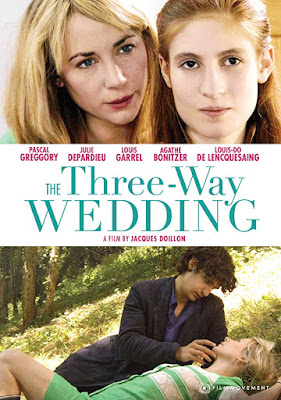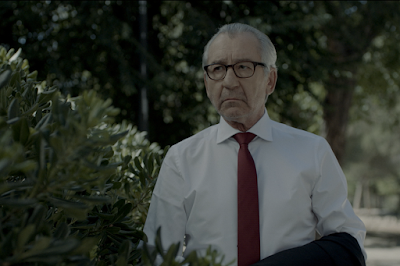Every so often (more like
few years), it seems, comes along a movie so original, so different from anything else you've seen that it seems to speak to something quite profound about our humanity, our strivings and our limitations. Back in 2014, it was a small documentary entitled
Magical Universe; this year it would seem to be another small-budget-but-huge-in-its-concerns doc called
SAM KLEMKE'S TIME MACHINE.
Sam Klemke, the film's "star," as well as one of the filmmakers here, is a rather ordinary fellow (that's he with cat, above in teenage days, and below, as an young adult) who hoped to become a well-known filmmaker when he was younger, back in the early 1970s. To this end he began filming himself and his surroundings from that time onwards (the invention of affordable home video equipment made this more possible and practical), and has ended up with what is perhaps the largest archive of film-about-oneself that exists today.
When Klemke posted a condensed YouTube video of his filming over the years that went viral, one of its viewers was Australian-based filmmaker/pop-culture excavator,
Matthew Bate, who with his co-writer
Sandy Cameron, made this 90-minute movie that distills Klemke's oeuvre into an amazing portrait of himself, his world, our world and humanity's strivings, foibles, needs and desires. Mr. Bate has assembled something so different and profound that it will be like little you've so far experienced from movies.
Someone -- I would guess this to be Bate, Cameron or both -- had the just-about-perfect notion of placing Klemke's story against that of the famous space probe,
Voyager, with its
Golden Records that supposedly demonstrate mankind's glorious achievements.
The Voyager was sent into space in the same year -- 1977 -- that Klemke began his filming and was sent, it was said, in hopes that some other life forms would eventually find it and learn all about mankind and what we have accomplished. (Conveniently left out, as the narration notes, were "accomplishments" such as The Holocaust.) Oh, the
chutzpah! And I mean this in terms of
both projects: the Voyager's and Klemke's.
To his everlasting credit, Bate had the good sense not to ram home the incredible differences in those Golden Records and Sam's home movies. He simply alternates the stories of Sam and Voyager, bringing up various facts and tales about each and letting us draw our own conclusions. Yet the manner in which all this is threaded and unfurled allows us to reach some pretty interesting assumptions on the way to being amused, moved and provoked into thinking about,
oh, so many things.
One of the funniest and most telling of these involves the fact that the late scientist/entertainer
Carl Sagan wanted to include photos on the voyager of a man and woman completely nude so that other life forms could see and understand how human beings of both sexes were built. Oh, the ruckus this began amongst Republicans and religious fundamentalists who felt that nudity was not to be tolerated. So the idea is scrapped, and guilt, shame, stupidity, hypocrisy and denial triumph -- as usual.
Contrast this with our Sam, who not only features himself nude and full frontal but with an erect cock -- both in his younger and his middle-age years. (From the look and size of his member, our guy might have had a more productive career making porno films.) The contrast here of western culture's hypocrisy and denial against an ordinary guy with a camera is breathtaking. As it is, almost consistently, all the way along in this fascinating film.
Whether Bate found (or had made) the soundtrack voice we hear narrating the Voyager footage, it was a brilliant notion to have it all in French, so that we can then take in the beauty of spoken French, even as we read the lovely, poetic subtitles that build a case for the importance of the voyager and its golden records. Without undue pushing, all this makes ever stranger, funnier and sadder the contrast with Klemke's life and "art."
So who
is Sam Klemke and what has he achieved? On one level he is a sad and deluded young, then middle-aged, then finally elderly male. We meet, briefly, many of the women who pass through his life as an "entitled" man (patriarchy is ever-present). but it is not in Sam's interest to allow us to get to know them or their attitudes beyond the cursory.
Sam does not finally achieve much of anything -- he fails at everything except his knack for good caricature, which he markets at locals malls -- and he often has to move back in with his parents. (How mom and dad felt about all this goes mostly unexplored.) And yet Sam persists. And endures. The movie may bring to mind
Samuel Beckett -- but with a lot more blather than minimalist poetry.
In any case, this juxtaposition of Klemke and Voyager is a brilliant move. Even as the documentary draws inward into Sam's tiny world, it simultaneously opens out into so much else. (The few moments in which we experience 9/11 through his and his girlfriend's eyes are remarkable.)
Again and again we are drawn up short and made to think, contrast and compare.
Sam Klemke's Time Machine is a singular experience, one that should not be missed by thinking/feeling adults and very probably by their teenage children, as well. It has been a long, long while since I have witnessed a movie so ripe for discussion and exploration, both during and after its viewing.
From
Virgil Films and
Visit Films and running just 90 minutes, the movie is available beginning tomorrow, Tuesday, March 29, on DVD and Digital HD -- for purchase or rental. To view the movie (via either rental or purchase), simply click
here and then click on WATCH NOW.





















































